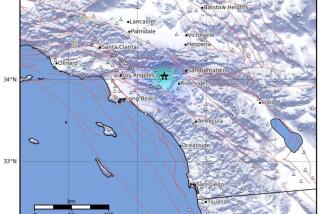Ventura Seeks to Sell Water Share in Project
Ventura city officials filled out order forms Tuesday for 3.26 billion gallons of Northern California water, hoping to sell it to another city and recoup some of Ventura’s yearly payment to the state water system.
The city has owned the rights to the water carried via the state’s central aqueduct for 31 years. But it has never actually ordered its allotted share of water because the city has no pipeline to the aqueduct.
City officials hope to reclaim a portion of the $800,000 that the city pays yearly for rights to the 10,000 acre-feet of water by paying yet more money for delivery of the water, then selling it to a user who can obtain the water. The City Council voted 5 to 0 at Monday’s meeting to order the water, the first step toward selling it.
But state Department of Water Resources officials said it is far from certain they would allow Ventura to sell its share of water.
“We’ve ordinarily not permitted transfers of ‘paper water,’ ” said David N. Kennedy, director of the Department of Water Resources.
Kennedy said he will decide by December whether to allow the lease deal to go forward, after consulting with all 29 agencies that contract with the state for water. He said he was unfamiliar with the details of the plan, and that approval will depend on how those details affect other water consumers.
A spokesman for the Metropolitan Water District, which serves Los Angeles and is by far the largest of the 29 state water contractors, said Tuesday the agency would not oppose the lease deal.
“If they can find a willing buyer, that is consistent with Met’s thought that the free marketing of California water ought to be as unfettered as possible,” district spokesman Jay Malinowski said.
State water officials were less enthusiastic.
“We’re a water-short project,” said Dan Flory, chief of the state Water Branch Contracts.
If each agency requested all the water it was entitled to, Flory said, the demand of more than 4 million acre-feet a year would far exceed the supply, which varies according to the rainfall. In 1993, the supply was 2.3 million acre-feet.
Ventura plans to request 10,000 acre-feet from the State Water Project. There are 326,000 gallons in one acre-foot, enough to supply two average-size families for one year.
*
Ventura is not the only local State Water Project member to consider cashing in on long-held water rights.
The Casitas Water District board of directors is expected to vote today to order the 5,000 acre-feet it is entitled to, with an eye toward joining with the city of Ventura to lease the 15,000 acre-feet to a single user.
John Johnson, general manager of the Casitas Water District, said he was unconcerned over a statewide increase in water demand because of orders from agencies seeking to lease their water entitlements.
“Wouldn’t it be nice to have a run on water? Then we could raise the prices,” Johnson said.
The bottom line, Johnson said, is that Casitas has been paying $400,000 a year for the water, and its 60,000 ratepayers in Ojai and western Ventura are entitled to the water or the money from its sale. Johnson refused to identify prospective buyers of the water.
The effect of a lease deal would be to change “paper water” into real water, said Steve Macaulay, general manager of the Assn. of State Water Contractors. “That has the effect of increasing the hard demand for water,” he said.
*
City officials dismissed to worries over statewide supply and demand. “We’ve always made it a point to pay them with real money,” said Henry Graumlich, administrative assistant in the Ventura Public Works Department.
Ventura Mayor Tom Buford said a lease deal would save the city money while allowing it to maintain the option to use state water for its own needs in the future.
If the city is unable to find a buyer for the water, it can cancel its order by April 30 and get back the extra money it would have to pay for delivery of the water, Graumlich said.
Macaulay of the State Water Contractors said the 1991 statewide Drought Water Bank “opened the door wide open” for water sales, leases and transfers. He said regulations are not keeping pace with marketing schemes.
“People ask, ‘What are the rules?’ ” Macaulay said. “Well, they are less than clear.”
More to Read
Sign up for Essential California
The most important California stories and recommendations in your inbox every morning.
You may occasionally receive promotional content from the Los Angeles Times.










